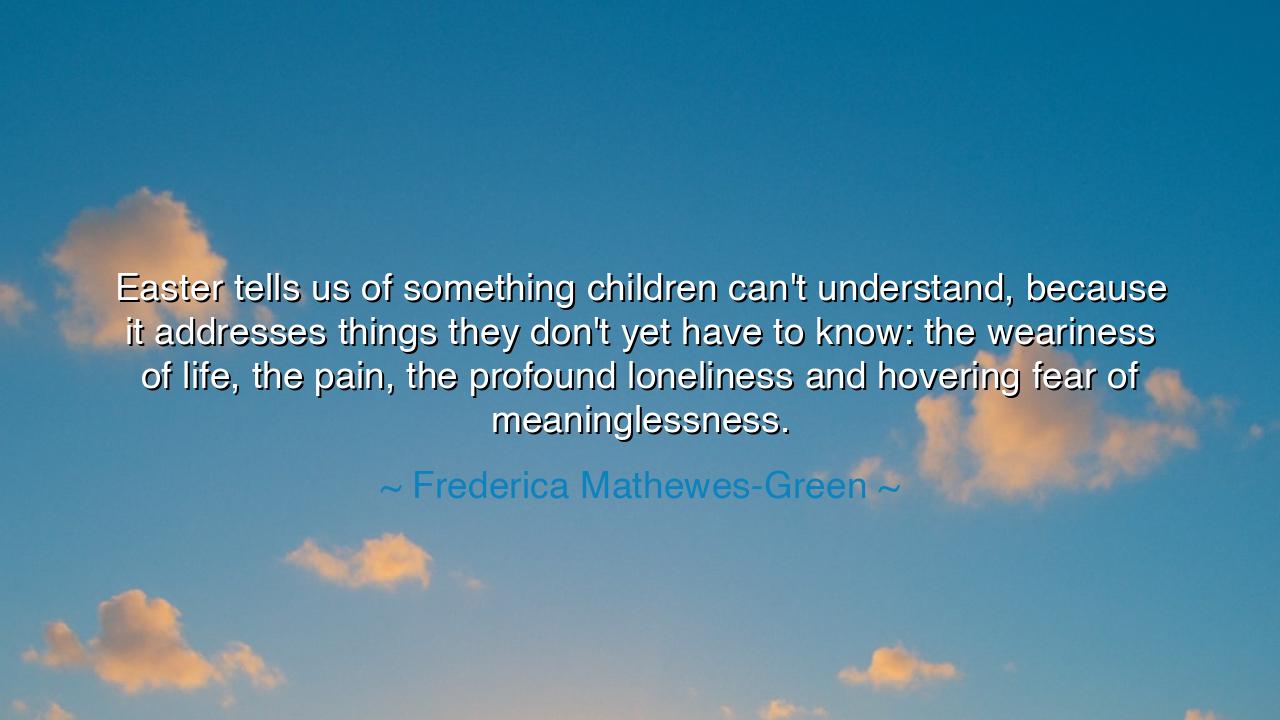
Easter tells us of something children can't understand, because
Easter tells us of something children can't understand, because it addresses things they don't yet have to know: the weariness of life, the pain, the profound loneliness and hovering fear of meaninglessness.






The words of Frederica Mathewes-Green — “Easter tells us of something children can’t understand, because it addresses things they don’t yet have to know: the weariness of life, the pain, the profound loneliness and hovering fear of meaninglessness” — are like a whisper from one who has walked long through the valley of human experience. In these words, she does not diminish the wonder of children, but honors the depth of Easter’s mystery — a truth that can only be fully grasped by those who have tasted sorrow. For Easter is not merely a festival of spring or an ornament of joy; it is the answer to despair. It speaks to the exhausted soul, the heart that has known darkness, and tells it that death is not the final word.
In the style of the ancients, we might say: the child sees the brightness of Easter, but the elder feels its fire. For children, the world still sings of endless beginnings — they have not yet met the shadow that lengthens with age. They rejoice easily, because they have not yet been tested by loss, by the silent ache of waiting, by the slow disillusionment that life often brings. But those who have wrestled with despair, who have looked into the abyss of meaninglessness, hear in Easter a message far deeper than celebration — they hear resurrection as deliverance. Mathewes-Green’s words remind us that the triumph of Easter shines brightest not for the innocent, but for the weary.
The origin of this quote rests in Mathewes-Green’s lifelong meditation on the Christian mystery — the movement from Good Friday to Easter Sunday, from suffering to redemption. As a writer, theologian, and convert to Eastern Orthodoxy, she has long reflected on the paradox at the heart of faith: that divine joy can only be understood through human pain. Her words reflect a truth known to all mystics and saints — that the resurrection of Christ cannot be appreciated until one has stood beneath the cross. Easter is not a denial of pain; it is the transfiguration of it. It does not erase the darkness, but fills it with light.
To grasp her meaning, consider the story of Viktor Frankl, the psychiatrist and Holocaust survivor who endured the unspeakable horrors of the concentration camps. Surrounded by death and stripped of all comfort, he found that the only freedom left to man was the power to choose meaning — to affirm life even in the face of annihilation. When Frankl emerged from that crucible, he understood what Easter proclaims: that life conquers despair, and that meaning rises from ashes. His experience mirrors the adult soul’s encounter with Easter — not as a child’s fairy tale of hope, but as a hard-won revelation born from suffering.
Mathewes-Green speaks, too, of the “hovering fear of meaninglessness” — that silent anxiety which visits even the most fortunate hearts. It is the fear that our struggles are futile, that love fades, that death ends all. Modern life, she implies, has given this fear new power, as faith has waned and distraction has become our drug. Yet Easter stands as a defiance of that fear. It declares that the tomb is empty — that meaning has triumphed over nihilism, and that what was once lost can yet be restored. For the one who feels the weariness of life, Easter is not naïve; it is revolutionary.
This is why Easter belongs most deeply to those who have suffered. The child sees colored eggs and flowers; the adult sees the stone rolled away. The child celebrates renewal; the adult clings to it. To the heart broken by betrayal, to the widow, to the wanderer who feels forgotten by God, the Easter story is not a metaphor — it is salvation itself. It says that no grave, literal or spiritual, can hold what God has destined for life. And in that truth, every tear finds purpose, and every loss finds promise.
Let this be the teaching passed down to all who listen: do not despise the pain that deepens your soul, for it is through that pain that you come to know the fullness of resurrection. When you feel the weight of meaninglessness pressing upon you, remember that even Christ descended into death — and rose again. Easter does not ask you to forget your suffering, but to carry it into the dawn and watch it be remade. Hope is not born from ease, but from endurance.
So, take comfort in Mathewes-Green’s wisdom: Easter speaks to the broken, not the unbroken. It is the song of the weary who dare to believe again, the promise to every soul that the dark night will end. Children may not yet understand this, but one day they will — when their hearts have been tempered by life, and they look upon the rising sun not as a child’s wonder, but as a pilgrim’s reward. For in the end, the meaning of Easter is not that death was defeated once, but that it is defeated always — in every heart that dares to hope.






AAdministratorAdministrator
Welcome, honored guests. Please leave a comment, we will respond soon